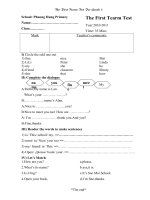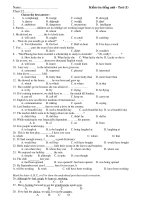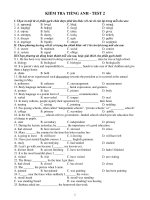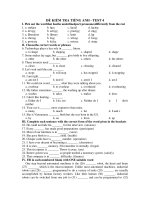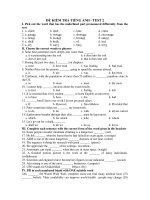KIỂM TRA TIẾNG ANH - TEST 1 (Units 1,2,3,4) pps
Bạn đang xem bản rút gọn của tài liệu. Xem và tải ngay bản đầy đủ của tài liệu tại đây (79.37 KB, 3 trang )
1
KIỂM TRA TIẾNG ANH - TEST 1 (Units 1,2,3,4)
I. Chọn ra một từ có phần gạch chân được phát âm khác với các từ còn lại trong mỗi câu sau:
1. A. cooks B. loves C. joins D. spends
2. A. advises B. raises C. devises D. goes
3. A. watched B. looked C. stopped D. played
4. A. concerned B. agreed C. developed D. lived
5. A. obedient B. precede C. attention D. independent
6. A. confide B. society C. primary D. certificate
II. Chọn phương án ứng với từ có trọng âm chính khác với 3 từ còn lại trong mỗi câu sau:
7. A. biologist B. secondary C. diversity D. compulsory
8. A. attractive B. cultural C. sacrifice D. educate
III.Chọn phương án đúng hoàn thành mỗi câu sau, hoặc giải thích cho phần gạch dưới:
9. Doctors are supposed to ___________ responsibility for human life.
A. do B. take C. rush D. join
10. Most doctors and nurses have to work on a ______________ once or twice a week at the hospital.
A. solution B. night shift C. household chores D. special dishes
11. Many young people have objected to ____________ marriage, which is decided by the parents of
the bride and groom.
A. cultural B. contractual C. independent D. romantic
12. The Americans are much more concerned with physical ______________ when choosing a wife or
husband
A. attractiveness B. attitudes C. counterparts D. values
13. The boy waved his hands to his mother, who was standing at the school gate, to ________ her
attention.
A. allow B. attract C. pull D. follow
14. We shouldn’t clap our hands to get the person’s attention because that is considered ___________.
A. polite C. obvious C. appropriate D. rude
15. In Vietnam, schooling is ________ for all children from the age of 6 to 14.
A. independent B. compulsory C. disruptive D. informal
16. The first year at college was probably the best and most _____________ year of my life.
A. challenging B. amazing C. daunting D. boring
17. She ___________ working in this company for 2 years.
A. will be B. has been C. had been D. is
18. They ___________ for 3 hours when the storm suddenly broke.
A. had been running B. have been running C. are running D. will be running
19. By this time next summer, you __________ your studies.
A. complete B. will complete C. are completing D. will have completed
20. Every day I _____________ up at 6 o’clock.
A. get B. will get C. have get D. had get
21. Yesterday when you phoned I _______ dinner with my family.
A. have B. had C. was having D. have had
22. The thief __________ the computer before we went last night.
A. stole B. steal C. was stealing D. had stolen
23. I _______ in Colorado 2 years ago, but now I live in Florida.
A. lived B. live C. had lived D. have lived
24. We _______ touch with each other since she moved to Canada.
A. lose B. lost C. had lost D. have lost
2
25. She said that she hadn’t visited her parents ___________
A. before B. then C. now D. ago
26. The state school system in England can ____________ into two levels of education.
A. divide B. be divided C. divided D. divides
27. - “ What’s your hobby, Hoa?” - “ _________”
A. well, I like collecting stamps B. Oh, with computers
C. Well, I want stamps D. Oh, on the time
28. “_______” – “Oh, it’s great!”
A. How is the English competition like? B. Would you like the English competition?
C. What do you like about the English competition? D. What do you think of the English competition?
29. “A motorbike knocked Ted down.”- “__________”
A. What is it now? B. Poor Ted! C. How terrific! D. What a motorbike!
30. “I have bought you a toy. Happy birth to you!”- “_________”
A. The same to you! B. Have a nice day! C. What a pity D. What a lovely toy! Thanks.
IV. Chọn phương án ứng với từ/cụm từ có gạch chân cần phải sửa trong các câu
31. Shakespeare’s tragedies have translated into many languages.
A B C D
32. Barbara asked me if did she have to do the homework that week.
A B C D
33. They asked me what did happen last night, but I was unable to tell them.
A B C D
34. They suggested go to the market to buy a little sugar.
A B C D
35. The jacket with three differently colors belongs to Hai, my brother.
A B C D
V. Chọn câu có nghĩa gần nhất với câu đầu bài.
36. Lan, “Why don’t we go out for dinner?”
A. Lan promised to go out for dinner. B. Lan suggested going out for dinner.
C. Lan admitted going out for dinner. D. Lan agreed to go out for dinner.
37. “I’m sorry. I can’t help you,” Peter said to me.
A. Peter promised to help me. B. Peter approved of helping me.
C. Peter suggested helping me. D. Peter regretted not to help me.
38. “It is a surprising gift. Thank you very much, Mary,” Mr. Pike.
A. Mr. Pike promised to give Mary a surprising gift.
B. Mr. Pike thanked Mary although she did not really like gift.
C. Mr. Pike thanked Mary for the surprising gift.
D. Mr. Pike congratulated Mary on the surprising gift.
39. Peter promised to pick Mary up at 10 o’clock.
A. Peter said, “Mary, I will pick you up at 10 o’clock.”
B. Peter said, “Mary, I am sorry for not picking you up at 10 o’clock.”
C. Peter said, “Mary, I am too busy to pick you up at 10 o’clock.”
D. Peter said, “Let’s pick Mary up at 10 o’clock.”
40. “If I were you, I would take a break,” Tom said to Daisy.
A. Tom wanted to take a break with Daisy.
B. Tom advised Daisy to take a break.
C. Tom suggested not taking a break.
D. Tom wanted to take a break, and so did Daisy.
VI. Đọc kỹ đọan văn sau và chọn phương án đúng (A hoặc B, C, D) cho mỗi chỗ trống
3
Most people work to earn a living, and produce goods and services. Goods are _______________
(1) agricultural (like milk) or manufactured (like cars). Services are such things ____________ (2)
education, medicine, and commerce. Some people provide products. An example can be a man who
produces goods such as rice. Some provide services. In a hotel, services can range from cleaning,
washing to arranging tours within and outside the city where ____________ (3). Other people provide
both goods and services. For example, in the same garbage a man may buy a car or some service which
helps him to maintain his car.
The work people do is called economic activity. All economic activities together make up the
economic system of a town, a city, a country, or the world. Such an economic system is the sum
______________ (4) and what they want. The work people undertake provides either what they need
or provides the money with _______________ (5) they can buy commodities and services which are
non-essential but which provide some particular personal satisfaction, like toys for children, visit to the
cinema, and books.
41. A. either B. both C. neither D. only
42. A. else B. for C. with D. as
43. A. are the guest staying B. the guests are staying
C. are staying the guests D. staying the guests are
44. A. what people do B. of total what people do
C. total of what people do D. of what people do in total
45. A. that B. without C. the money D. which
VII. Đọc kỹ đọan văn sau và chọn phương án đúng cho mỗi câu:
“Where is the university?” Is a question that many visitors to Cambridge ask, but no one can give
them a clear answer, for there is no wall to be found around the university. The university is the city.
You can find the classroom buildings, libraries, museums and offices of the university all over the city.
And most of its members are the students and teachers or professors of the thirty one colleges.
Cambridge was already developing town long before the first students and teachers arrived 800 years
ago. It grew up by the river Granta, as the Cam was once called. A bridge was built over the river as
early as 875.
In the fourteen and fifteen centuries more and more land was used for college buildings. The town
grew much faster in the nineteen century after the opening of the railway in 1845. Cambridge became a
city in 1951 and now it has the population of over 100,000. Many young students want to study at
Cambridge. Thousands of people from all over the world come to visit the university town. It has
become a famous place all round the world.
46. Why do most visitors come to Cambridge?
A. to see university B. to study in the colleges in Cambridge
C. to find the classroom buildings D. to use the libraries of the university
47. Around what time did the university begin to appear?
A. In the 8
th
century B. In the 13
th
century C. In the 9
th
century D. In the 15
th
century
48. Why did people name Cambridge the “city of Cambridge”
A. Because the river was very well-known. B. Because there is a bridge over the Cam
C. Because it was a developing town. D. Because there is a river named Granta
49. After which year did the town rally begin developing?
A. After 800 B. After 875 C. After 1845 D. After 1945
50. From what we read, we know that Cambridge is now ______________.
A. visited by international tourists B. a city without wall
C. a city of growing population D. a city that may have a wall around it.
